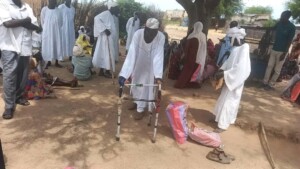Health emergency declared in West Darfur as chikungunya cases rise
A State of Health Emergency has been declared in West Darfur in Sudan after 41 cases of chikungunya* fever were confirmed. On Monday, the governor of West Darfur, Mohamed El Doma, made the declaration after confirming that 41 people were infected with chikungunya out of a total of 52 suspected cases. There is also a scarcity of medicines, medical supplies, and hospital capacity.
 Aedes aegypti mosquito is the main vector for the spread of chikungunya (Picture: vectorbase.org)
Aedes aegypti mosquito is the main vector for the spread of chikungunya (Picture: vectorbase.org)
A State of Health Emergency has been declared in West Darfur in Sudan after 41 cases of chikungunya* fever were confirmed. On Monday, the governor of West Darfur, Mohamed El Doma, made the declaration after confirming that 41 people were infected with chikungunya out of a total of 52 suspected cases. There is also a scarcity of medicines, medical supplies, and hospital capacity.
The unusually heavy rainy season has made control of vectors such as mosquitoes extra challenging. The First Aid Hospital in the state capital El Geneina is overcrowded and running short of equipment, and lacks sufficient of medical staff, beds, and wards.
Governor El Doma described the situation as very worrying. A committee has been formed to harness all the state’s capabilities to limit the spread of the disease. The governor called on the United Nations agencies and organisations operating in the state as partners to confront the health situation.
While no deaths have been recorded, the governor appealed to the public in West Darfur to adhere to the health guidelines issued by the Ministry of Health. He said that the state has begun to sanitize the environment, but did not take into account the control of disease vectors [chiefly mosquitoes] owing to the heavy rains that fell this year.
Malaria
Dr Mohamed Yahya, Director of the West Darfur Ministry of Health confirmed an increase in malaria cases in the state which exceed the response and treatment capabilities the state.
He appealed to the federal Ministry of Health to intervene in order to save the situation, citing the scarcity of the pesticides that have been developed for these emergencies.
Northern State
In Northern State, fevers are still prevalent in Ed Debba and Merowe localities, which, as previously reported by Radio Dabanga, has led to deaths and many cases of infection.
In a meeting with Prime Minister Abdallah Hamdok in Khartoum on Monday, Governor Amal Ezzeldin of Northern State, indicated the ongoing efforts to combat the fever epidemic that has recently spread in the state through field surveys and control, pointing to the state’s need for more spraying machines for pesticides. In the localities of Merowe and Ed Debba in Northern State, “fevers accompanied by bleeding and a decrease in blood platelets” resulted in the death of 10 people and left hundreds in critical condition last month.
*Chikungunya key facts (Source: WHO)
- Chikungunya is a viral disease transmitted to humans by infected mosquitoes. It causes fever and severe joint pain. Other symptoms include muscle pain, headache, nausea, fatigue and rash.
- Joint pain is often debilitating and can vary in duration.
- The disease shares some clinical signs with dengue and zika, and can be misdiagnosed in areas where they are common.
- There is no cure for the disease. Treatment is focused on relieving the symptoms.
- The proximity of mosquito breeding sites to human habitation is a significant risk factor for chikungunya.
- The disease mostly occurs in Africa, Asia and the Indian subcontinent. However a major outbreak in 2015 affected several countries of the Region of the Americas.
Chikungunya is a mosquito-borne viral disease first described during an outbreak in southern Tanzania in 1952. It is an RNA virus that belongs to the alphavirus genus of the family Togaviridae. The name “chikungunya” derives from a word in the Kimakonde language, meaning “to become contorted”, and describes the stooped appearance of sufferers with joint pain (arthralgia).
Radio Dabanga’s editorial independence means that we can continue to provide factual updates about political developments to Sudanese and international actors, educate people about how to avoid outbreaks of infectious diseases, and provide a window to the world for those in all corners of Sudan. Support Radio Dabanga for as little as €2.50, the equivalent of a cup of coffee.












 and then
and then